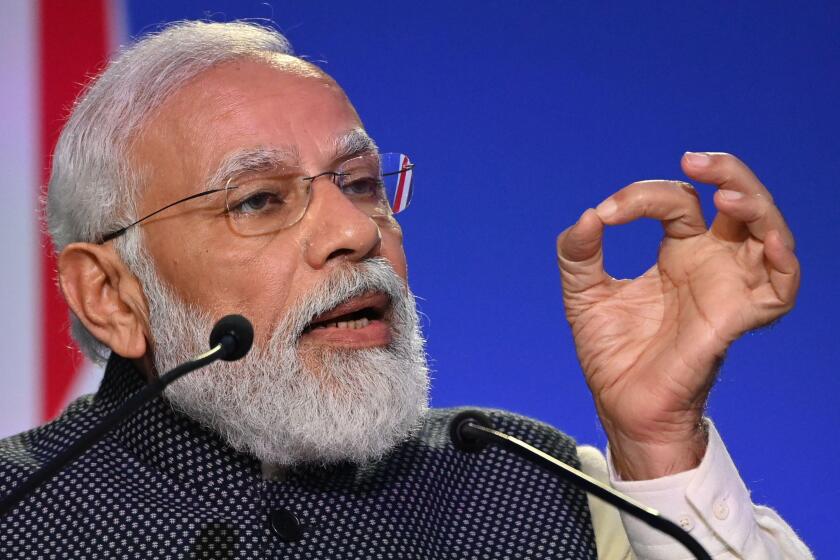This week’s UN Climate Change Conference in Glasgow saw emerging markets politicians demand the developed world to live up to its climate finance pledges. Several EM bond investors backed the positions of these governments, noting that rich countries were failing to appreciate the challenges faced by the developing world.
On Monday, India’s prime minister Narendra Modi grabbed attention with a speech highlighting that the $100bn a year that developed nations had pledged to provide for developing countries in 2009 was not enough. Even though the developed world is struggling to provide that funding, Modi said he expects developed nations to make $1tr available as soon as possible.
Uruguay’s finance minister Azucena Arbeleche, who is also chair of the World Bank’s Development Committee, echoed Modi’s $1tr per annum figure at an event at COP26.
“The truth is we need transformative change,” said Arbeleche. “Emerging markets will need $1tr of additional investment annually for decades, to build green energy and climate-resilient infrastructure. But our public sector balance sheets will be constrained in the Covid-19 world.”
In a similar vein, Bolivia’s president Luis Arce said that without an immediate solution to the lack of climate financing, the governments of the developed market will lose their credibility with emerging nations.
“We developing countries can meet our emissions targets, but only if there is financing available,” said Arce. “The market mechanisms that have been used so far have not worked.”
Bolivia had hosted the ‘Like-Minded Developing Countries’ ministerial meeting in the run-up to COP26, arguing that the call for all countries to adopt net zero targets by 2050 was “anti-equity and against climate justice”. The group, which includes China and India — which this week committed to hitting net-zero emissions, but only by 2070 — represents over half the world’s population.
Yet some EM leaders appeared to make strides. South Africa’s president Cyril Ramaphosa arrived in Glasgow seeking a financing deal, as he argued that sustainable transition would negatively impact large swathes of his country’s economy. On Tuesday, he was celebrating an $8.5bn package that includes grants and concessional financing.
Other Latin American countries were also bold in asking for more climate financing. Guillermo Lasso, Ecuador’s president, proposed that his government should have its debt reduced in return for expanding the protective area around the Galapagos Islands — similar to the debt-for-nature swap to be used in Belize’s imminent restructuring. And Argentina’s president Alberto Fernández argued that his country should be allowed to repay some of its $46bn IMF debt by investing in green infrastructure, rather than in cash.
“Of course, Argentina has jumped on the bandwagon of asking for money,” said one head of EM syndicate. “EM issuers have all the incentives to ask for this right now as developed nation politicians cannot say no on the spot. But realistically I don’t think they’re going to send loads more money to EM because sources are not infinite.”
Market sympathy
Bond investors largely had sympathy with the governments that they finance.
“EM countries are on the frontline here,” said the head of EM debt at one European investment fund. “They’re very vulnerable to climate change shocks and are vital for preserving biodiversity and natural resources. But they’re also very much hostage to the broader discussion going on between the governments of developed economies.
“There has to be a recognition of the finance that will be required in emerging economies to deal with the transition to lower carbon emissions.”
Another London-based EM sovereign bond buyer said that emerging markets were in a “very tight spot”.
“Money has been promised and it hasn’t materialised,” he said. “For the target to be meaningful you need to start with a blank sheet of paper and look at what new financing is coming.
“When developed market governments count existing aid budgets as part of their transfer, that’s not valid either.”
This investor was perturbed that carbon pricing had not been a larger part of discussions in Glasgow.
“If the developed world could agree on a rigorous carbon tax, it could generate the revenues that could be reallocated within the countries and emerging markets to finance the transition,” he said. “As an economist, for me the concept of ‘the polluter pays’ has to be the solution.”
Part of investors’ sympathy is born out of self-preservation. If climate change is not slowed, it will have serious impacts on emerging economies — especially if their infrastructures are not made more resilient.
“If Brazil’s fiscal picture or social unrest is a worry today, imagine it when economic output is 60% lower by 2100, which is what some reckon could happen under a worst-case scenario,” said the EM debt head.
Anti-EM bias
Sustainable capital markets are growing rapidly in the emerging markets, and just this week Amundi and the IFC launched another fund dedicated to buying sustainable bonds from emerging issuers. But investors said this was not the solution.
“The onus is not on bond markets. And funding budget deficits, which is what we essentially do, can’t be classified as part of that $100bn — whether it’s green bonds or not,” said the second investor.
Still, if sustainable financing instruments can lead to a lower cost of funding for emerging nations, that should be a positive. This week Arbeleche, who is part of Uruguay’s market-friendly administration, said that sustainability-linked financing should not just bring higher coupons if issuers miss targets, but also include lower funding costs for the best performers.
For this to materialise, however, more capital must head towards the emerging markets. A third EM fund manager argued that the lack of official financing heading towards developing nations was symptomatic of how they were being marginalised in ESG discussions and that the capital markets did not understand the challenges facing the emerging markets.
“I have to admit it’s got to the point where ESG criteria feel very biased against emerging markets,” said the fund manager. “When I look at what I can’t buy for ESG reasons, I just feel these policies are hurting emerging markets more than anything else.”
He said that EM issuers were right to ask richer countries to cut them some slack.
“You’ve polluted for years, have pillaged our countries for centuries, and have loads of money,” said the investor. “We emerging markets are relatively insignificant contributors to climate change.
“I’d love it if India could do net zero long before 2070, but I fully understand they have to do it in a way that has the least negative impact on their development.”
The fund manager said there was a greater need for sustainable finance professionals to engage with EM issuers.
“We can absorb the cost of green policies in the UK because there’s a high enough standard of living, while countries still trying to feed themselves don’t have the disposable income to do this.
“There are too many non-EM people making these policies: I’ve had to sit in meetings and convince people that we can’t judge Zambia on the same grounds as Singapore.”
The second bond buyer said he “completely sympathised” with the fund manager’s view, noting that rich companies would inevitably score higher marks than poor countries in ESG rankings. However, he said it was a challenge to persuade clients to take a nuanced view.
“People are so scared about putting money in the wrong places, and there’s a risk that the upshot of this is EM ends up even more under-allocated than it already is,” he said. “We try to convince them that it’s the trajectory that matters, but not all clients have time for in-depth conversations.”





